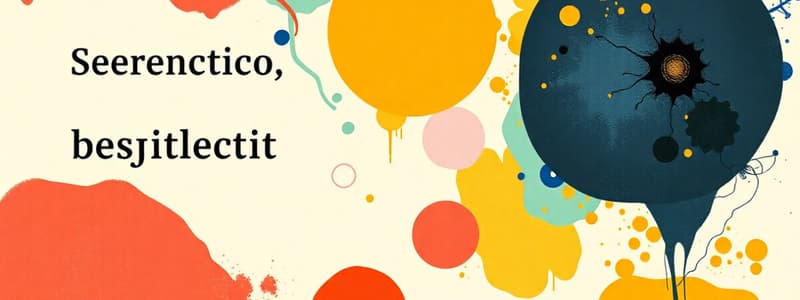Podcast
Questions and Answers
What defines psychological research as scientific?
What defines psychological research as scientific?
- It is focused solely on observational data.
- It is based on personal opinions.
- It follows the scientific method and utilizes empirical evidence. (correct)
- It relies on intuition and anecdotes.
What is the primary purpose of a hypothesis in psychological research?
What is the primary purpose of a hypothesis in psychological research?
- To summarize the research findings.
- To suggest a testable prediction about the outcome of an investigation. (correct)
- To formulate theories based on observation.
- To provide a definitive answer to a research question.
Which statement is true regarding independent and dependent variables?
Which statement is true regarding independent and dependent variables?
- The independent variable is what you measure in an experiment.
- The dependent variable is what you manipulate in an experiment.
- The dependent variable is unaffected by the independent variable.
- The independent variable affects the dependent variable. (correct)
What does operationalising variables mean in psychological research?
What does operationalising variables mean in psychological research?
Which of the following is NOT a characteristic of non-scientific ideas?
Which of the following is NOT a characteristic of non-scientific ideas?
What is the aim of a psychological investigation?
What is the aim of a psychological investigation?
Which type of study is best suited for determining cause and effect relationships?
Which type of study is best suited for determining cause and effect relationships?
What is a potential limitation of within subject's design in experiments?
What is a potential limitation of within subject's design in experiments?
In research terminology, what does 'controlled variables' refer to?
In research terminology, what does 'controlled variables' refer to?
Which statement best describes the cycle of the scientific method?
Which statement best describes the cycle of the scientific method?
What role do models play in psychology?
What role do models play in psychology?
For a hypothesis to be considered valid, it must include which of the following?
For a hypothesis to be considered valid, it must include which of the following?
Which quality is essential for scientific ideas?
Which quality is essential for scientific ideas?
What is essential about the experimental group in a controlled experiment?
What is essential about the experimental group in a controlled experiment?
Flashcards
Psychology Definition
Psychology Definition
The scientific study of human mental states and behaviour.
Scientific Ideas
Scientific Ideas
Objective ideas using empirical evidence, the scientific method, and verifiable predictions/theories.
Non-scientific Ideas
Non-scientific Ideas
Ideas that are not objective, don't use empirical evidence, and are imprecise, dogmatic, and unverifiable.
Scientific Method
Scientific Method
Signup and view all the flashcards
Theory
Theory
Signup and view all the flashcards
Model
Model
Signup and view all the flashcards
Aim
Aim
Signup and view all the flashcards
Hypothesis
Hypothesis
Signup and view all the flashcards
Independent Variable
Independent Variable
Signup and view all the flashcards
Dependent Variable
Dependent Variable
Signup and view all the flashcards
Population
Population
Signup and view all the flashcards
Operationalising Variables
Operationalising Variables
Signup and view all the flashcards
Controlled Variables
Controlled Variables
Signup and view all the flashcards
Controlled Experiment
Controlled Experiment
Signup and view all the flashcards
Within-Subjects Design
Within-Subjects Design
Signup and view all the flashcards
Study Notes
Week 1 ECP Study Notes
- Psychology Definition: Psychology is the scientific study of human mental states and behavior. It employs the scientific method.
Scientific Ideas
- Objective: Scientific ideas aim for objectivity.
- Empirical Evidence: They utilize and generate empirical evidence (observed or experimentally derived).
- Scientific Method: Formed using the scientific method.
- Verifiable: Predictions, models, and theories are verifiable.
Non-Scientific Ideas
- Non-Objective: Non-scientific ideas are subjective.
- Un-Empirical: Based on theories, not observation.
- Imprecise/Vague: Lack clarity and specificity.
- Dogmatic: Not open to questioning.
- Unverifiable: Cannot be proven or disproven.
Formation of Non-Scientific Ideas
- Anecdotes: Based on personal stories.
- Opinions: Subjective viewpoints.
- Intuition: Gut feelings.
- Hearsay: Information from others.
The Scientific Method
- Procedure for Knowledge: A cyclical process for obtaining knowledge.
- Starts with a question/theory: The method begins with an existing theory or question.
- Hypothesis Creation: A testable prediction is formulated about the theory/question.
- Study Design & Research: A specific study is designed to test the hypothesis. Research is conducted based on this design.
- Theory Revision/Creation: Concludes with either refinement of the existing theory or a new theory.
Theories
- Explanatory & Predictive: Theories explain phenomena and make predictions about cause-and-effect.
- Scientifically-Based/Logical: Informed by scientific research and/or logic.
Models
- Representations: Simplify and represent concepts, processes, or behaviors.
- Simplified Representation: Models simplify complex information.
- Theory-Based: Derived from scientific theories or ideas.
Aims
- Investigation Purpose: Concise statements describing the study's purpose (one sentence).
- Key Terms: Includes key terms of the topic.
- Starts with "To": Begins with the word "to."
- Narrow Focus: Helps narrow the scope of the investigation.
Hypotheses (I.P.A.D.)
- Testable Predictions: A testable prediction about the outcome of an investigation.
- Variables, Population, Direction: Must include variables, population, and a predicted direction (e.g., increase, decrease).
- "It is hypothesized/predicted": Begin with this phrase.
Variables
- Independent Variable (IV): Manipulated variable.
- Dependent Variable (DV): Measured variable.
- IV affects DV: The IV impacts the DV.
Population
- Research Focus: The group being studied.
Operationalizing Variables
- Specificity: Making variables more specific and clear.
- Measurement/Scale: Adding measurements or scales to operationalize.
Controlled Variables
- Constant Factors: Variables other than the IV/DV that are held constant.
- Cause-and-Effect: Ensures changes in the DV are due solely to the IV.
Investigation Methodologies
- Types of Studies: Controlled experiments, case studies, correlational studies.
- Techniques: Classification, identification, fieldwork, literature reviews, modeling.
Controlled Experiments
- Variable Manipulation: Design allows strict manipulation of variables.
- Cause-and-Effect: Can establish cause-and-effect relationships.
- Two Groups: Experimental and control groups.
- Control Group: Serves as the baseline.
- Expectancy Effect: Considered when creating the control group.
Within-Subjects Design
- Exposure to All Conditions: Each participant experiences all experimental conditions (including control).
- Strengths: Increased accuracy due to individual differences being accounted for and fewer participants needed.
- Limitations: (details not provided).
Studying That Suits You
Use AI to generate personalized quizzes and flashcards to suit your learning preferences.
Description
This quiz focuses on the foundational concepts of psychology, differentiating scientific ideas from non-scientific ones. Dive into the crucial elements of the scientific method and understand how psychology employs empirical evidence to study human behavior. Perfect for students beginning their exploration of psychological principles.


